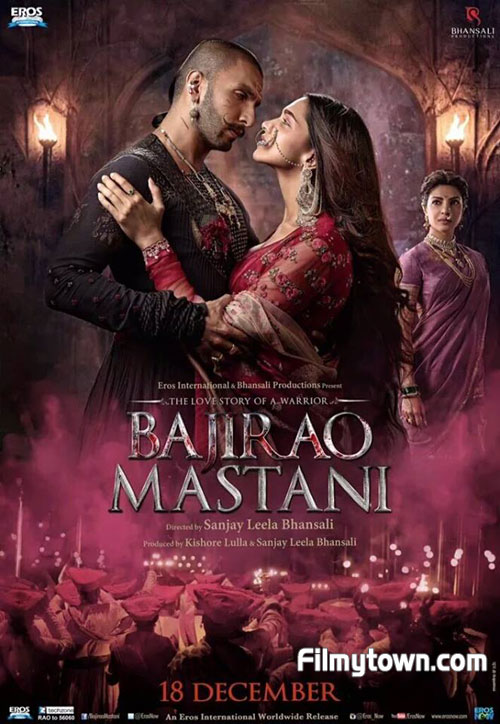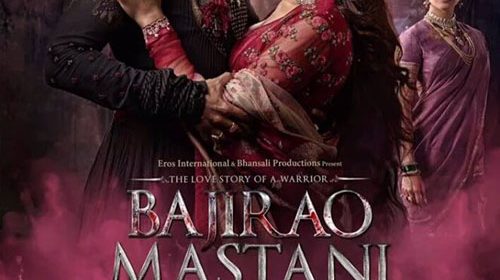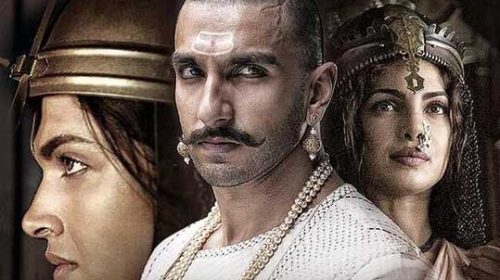A masterpiece of love, and war, exploring the romantic side of a 18th-century Maratha general, Bajirao Ballal Bhat, a brahmin by birth and who fought and won 41 battles at a stretch against the Mughals with an aim to create a unified Hindu kingdom across India.
The glorious rule of the Peshwas, its grandeur, their culture, and the their large heartedness during those times takes us back to that era of righteous rulers which we have only learnt in our history lessons.
It opens with a Maratha emperor Chhatrapati Shahu (Mahesh Manjrekar) seeking nominations for the post of the Peshwa (a Prime Ministerial candidate). The brahmin youth Bajirao (Ranveer Singh) with his superlative display of his skill and wisdom lands him the title. History has a special mention about this Peshwa’s reputation as a warrior and statesman par excellence which is widely known.
Bajirao Mastani is a dramatic depiction of that particular phase of Bajirao’s life in particular when the kingdom of Bundelkhand was undersiege and the king Chatrasal appealed to the Marathas for help. The messenger is his daughter Mastani (Deepika Padukone) who impresses the engrossed Bajirao, whose troops were engaged elsewhere.
The Mughal army was given a fitting reply by the master stragesist Bajirao, who were then badly defeated and mauled by the Peshwa’s army.
Extremely impressed coupled with a sense of gratification, Mastani falls in love with Bajirao, like the love of Radha for Lord Krishna. Bajirao too has lost his heart for her.
Complications arise when Mastani leaves her father’s kingdom to lead the rest of her life in her beloved’s kingdom. Bajirao already is married to the sweet Kashibai (Priyanka Chopra). Still this to would have been tackled, except that Bajirao’s mother declares that Mastani is born of a Muslim mother, hence she is a Muslim, and that she would never have been accepted in their Peshwa family, which are Hindu Hindu Brahmins.
On several occasions, one can actually feel the energy oozing from Ranveer literally. Like prior to departing for another war with a war cry – ‘Har Har Mahadev’ chants, and then while in the battlefield with his crafty swordmanship.
Here is a brilliant actor who emotes well, is so natural in his romance with his wife Kashibhai and those close moments with Mastani. One never sees Ranveer Singh who appears so drenched in Bajirao’s character with his typical Maratha diction, mannerisms.
It is to Sanjay Leela Bhansali’s credit that Bajirao Mastani is an example of superb creative exploitation of cinematic liberties and the manner in which the film is presented, especially that of its pivotal characters.
One instantly falls in love with each of these characters – Kashibai, Mastani and Bajirao. Throughout the film, one feels for them whether it is during the loneliness of Kashibhai or the intense portrayal of love by Mastani and then the most lovable of them – the determination, agression and the helplessness of Bajirao, particularly when the Brahmins revolt against him for bringing in a girl from the Muslim community.
It is a visual treat with superb performances by Deepika, Priyanka, Ranveer, Milind Soman and Tanvi Azim.
There are notable numbers like Malhari and Pinga, with soundtrack composed by Sanjay Leela Bhansali
It is such a wonderful film with touching climax where one empathizes with Bajirao’s state of mind with his wild imaginations with high temperature running on him and his perception about the ememy approaching over the river waters.
The message from this epic film is that all religions in the world preach about love. Love is not confined to any religion. Love is a religion in itself.
A remarkable film, makes one privileged to see history been created once again.
Click on the Thumbnails for ENLARGED PICS:
Cast:
Ranveer Singh as Peshwa Bajirao
Deepika Padukone as Mastani
Priyanka Chopra as Kashibai, Bajirao’s first wife
Tanvi Azmi as Radhabai, Bajirao’s mother
Milind Soman as Ambaji Panth
Sukhada Khandkekar as Anubai, Baji Rao’s sister
Anuja Gokhale as Bhiubai, Baji Rao’s sister
Vaibbhav Tatwawdi as Chimaji Appa, Bajirao’s younger brother
Mahesh Manjrekar as the Maratha Emperor ‘Chhattrapati Shahu’
Credits:
Banner – Eros International, SLB Films
Produced by Kishore Lulla, Sanjay Leela Bhansali
Director – Sanjay Leela Bhansali
Music Director – Sanjay Leela Bhansali
Background Music by Sanchit Balhara
Lyrics by A.M. Turaz, Siddharth-Garima, Prashant Ingole
Editor – Rajesh G. Pandey
Cinematography – Sudeep Chatterjee
Screenplay – Sanjay Leela Bhansali, Mallika Dutt Gharde, Prakash Kapadia
Dialogues by Prakash Kapadia
Production Designers – Sriram Kannan Iyengar, Sujeet Subhash Sawant, Saloni Ankush Dhatrak
Action – Sham Kaushal
Choreographers – Remo DSouza, Pandit Birju Maharaj, Ganesh Acharya, Pony Verma, Shampa Gopikishna
Costume Designers – Maxima Basu, Anju Modi
Bajirao Mastani, movie review







